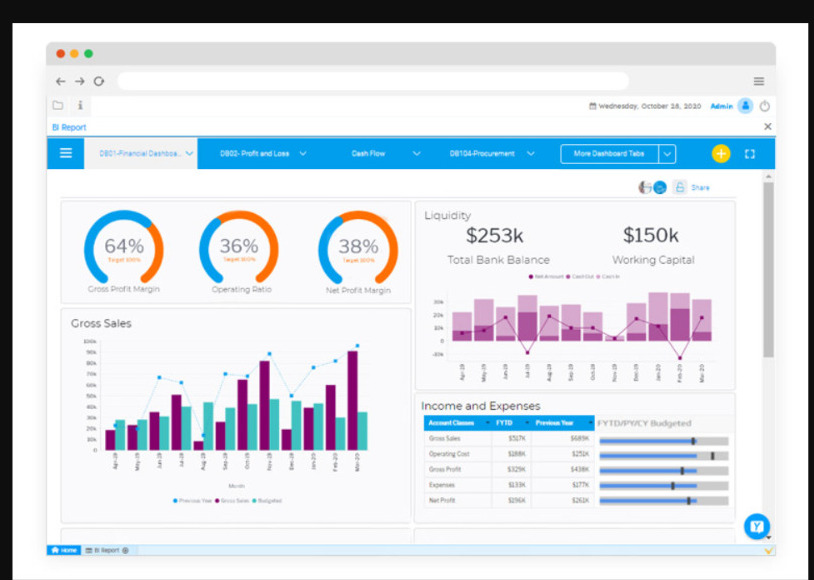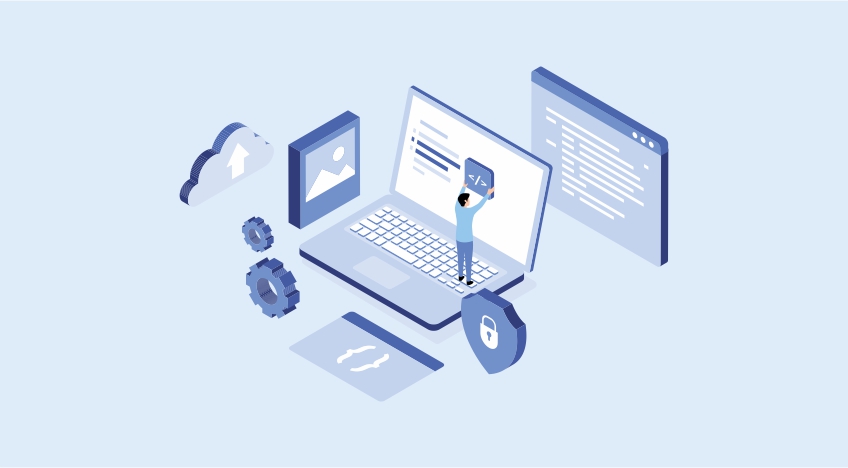
ERP (Enterprise Resource Planning) accounting software is a type of business software used by organizations to manage their financial information and operations. This software integrates various aspects of financial management, including accounts payable and receivable, billing, payroll, general ledger, and other financial functions.
The ERP accounting software allows businesses to track and manage financial data in real-time. It provides a centralized platform for all financial information, enabling companies to generate accurate financial reports and make informed decisions. This software automates various financial tasks, reducing the manual workload for financial professionals, and minimizing errors in financial reporting.
The ERP accounting software is highly customizable and can be tailored to meet the specific needs of a business. It can be integrated with other business functions, such as inventory management and supply chain management, to provide a comprehensive view of the organization's financial health.
ERP accounting software is an essential tool for businesses of all sizes that require a streamlined, efficient, and accurate way to manage their financial operations. It can help businesses save time, reduce costs, and make better financial decisions.
Integration: ERP accounting software integrates various financial functions, including accounts payable, accounts receivable, general ledger, payroll, and billing. This integration provides a comprehensive view of the organization's financial health.
Customization: ERP accounting software is highly customizable and can be tailored to meet the specific needs of a business. It can be configured to handle different currencies, tax laws, and accounting regulations.
Automation: ERP accounting software automates many financial tasks, reducing the manual workload for financial professionals. This automation minimizes errors in financial reporting and frees up time for financial professionals to focus on more strategic activities.
Real-time data: ERP accounting software provides real-time data, enabling businesses to make informed decisions based on up-to-date financial information.
Scalability: ERP accounting software is scalable and can grow with the organization's needs. As a business expands, the software can be easily upgraded to handle the increased financial complexity.
Security: ERP accounting software provides robust security features to protect financial data. Access to sensitive financial information is restricted to authorized personnel, and data is stored securely.
ERP accounting software is an essential tool for businesses looking to streamline their financial operations, improve accuracy, and make better financial decisions. It provides a centralized platform for managing financial data, automates various financial tasks, and provides real-time data for informed decision-making
Increased collaboration: ERP accounting software provides a centralized platform for managing financial data, enabling collaboration across different departments and teams. This collaboration improves communication, reduces errors, and ensures that everyone has access to the same up-to-date financial data.
Regulatory compliance: ERP accounting software is designed to comply with different accounting regulations and tax laws. This compliance ensures that businesses are adhering to relevant financial regulations and avoiding penalties.
Cost savings: ERP accounting software can help businesses save costs by automating various financial tasks, reducing errors, and improving efficiency. This cost savings can be significant, especially for small and medium-sized businesses.
IERP accounting software is an essential tool for businesses looking to improve financial management, accuracy, and decision-making. It provides a centralized platform for managing financial data, automates various financial tasks, and provides real-time data for informed decision-making.
Project management: ERP accounting software can integrate with project management software, enabling businesses to manage project costs, track progress, and allocate resources.
Customer relationship management: ERP accounting software can integrate with customer relationship management (CRM) software, enabling businesses to manage their customer data, track sales, and manage customer interactions.
ERP accounting software provides a range of features and capabilities, including multi-currency support, budgeting and forecasting, audit trails, asset management, inventory management, project management, and customer relationship management. These features enable businesses to manage their financial operations more efficiently, improve accuracy, and make informed decisions.
ERP accounting software is important for businesses for several reasons:
Streamlined financial operations: ERP accounting software enables businesses to manage their financial operations more efficiently by automating various financial tasks, reducing manual workloads, and minimizing errors in financial reporting. This streamlined process helps businesses save time and money and reduces the risk of errors in financial reporting.
Improved accuracy: ERP accounting software provides accurate, real-time data, enabling businesses to generate detailed financial reports and make informed decisions. This accuracy helps businesses make better financial decisions, identify financial trends, and avoid potential risks.In summary, ERP accounting software is important for businesses because it streamlines financial operations, improves accuracy, provides comprehensive financial management, is scalable, and ensures regulatory compliance. These benefits help businesses save time and money, make better-informed decisions, and operate more efficiently.
Integration with other systems: ERP accounting software can integrate with other business systems, such as inventory management, project management, and customer relationship management. This integration ensures that financial data is up-to-date and accurate, and helps businesses make informed decisions about their operations.
Cost savings: ERP accounting software can help businesses save costs by automating various financial tasks, reducing errors, and improving efficiency. This cost savings can be significant, especially for small and medium-sized businesses.
Enhanced data security: ERP accounting software provides enhanced data security, enabling businesses to control access to financial data and ensure that it is protected from unauthorized access. This security helps businesses protect their financial data and reduces the risk of financial fraud.
Real-time financial reporting: ERP accounting software provides real-time financial reporting, enabling businesses to monitor their financial performance and make informed decisions based on up-to-date data. This real-time reporting helps businesses identify potential issues and take corrective action before they become major problems.
Customizable reporting: ERP accounting software provides customizable reporting capabilities, enabling businesses to generate reports that are tailored to their specific needs. This customization helps businesses generate reports that are relevant to their operations and enables them to make better-informed decisions.
Easy collaboration: ERP accounting software enables easy collaboration between different departments and teams, enabling them to work together more efficiently and share data in real-time. This collaboration helps businesses improve productivity, reduce errors, and improve decision-making.
Improved forecasting: ERP accounting software provides budgeting and forecasting capabilities, enabling businesses to predict future financial performance based on historical data. This forecasting helps businesses plan for future growth and make strategic decisions that will drive their success.
Better financial management: ERP accounting software provides better financial management by enabling businesses to track expenses, manage cash flow, and optimize financial performance. This management helps businesses stay on top of their finances and make informed decisions that will drive their growth and success.
In summary, ERP accounting software is important for businesses because it provides real-time financial reporting, customizable reporting, easy collaboration, improved forecasting, and better financial management. These benefits help businesses operate more efficiently, make better-informed decisions, and stay competitive in today's fast-paced business environment.





